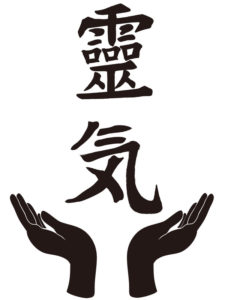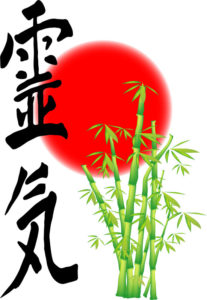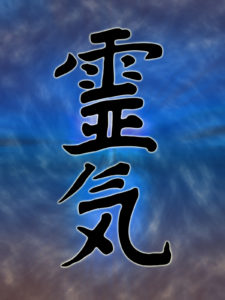 The word Reiki is composed of two Japanese words – Rei and Ki. When translating Japanese into English we must keep in mind that an exact translation is difficult. The Japanese language has many levels of meaning. Therefore the context the word is being used in must be kept in mind when attempting to communicate its essence. Because these words are used in a spiritual healing context, a Japanese/English dictionary does not provide the depth of meaning we seek, as its definitions are based on common everyday Japanese. As an example, Rei is often defined as ghost and Ki as vapor and while these words vaguely point in the direction of meaning we seek, they fall far short of the understanding that is needed.
The word Reiki is composed of two Japanese words – Rei and Ki. When translating Japanese into English we must keep in mind that an exact translation is difficult. The Japanese language has many levels of meaning. Therefore the context the word is being used in must be kept in mind when attempting to communicate its essence. Because these words are used in a spiritual healing context, a Japanese/English dictionary does not provide the depth of meaning we seek, as its definitions are based on common everyday Japanese. As an example, Rei is often defined as ghost and Ki as vapor and while these words vaguely point in the direction of meaning we seek, they fall far short of the understanding that is needed.
When seeking a definition from a more spiritual context, we find that Rei can be defined as the Higher Intelligence that guides the creation and functioning of the universe. Rei is a subtle wisdom that permeates everything, both animate and inanimate. This subtle wisdom guides the evolution of all creation ranging from the unfolding of galaxies to the development of life. On a human level, it is available to help us in times of need and to act as a source of guidance in our lives. Because of its infinite nature, it is all knowing. Rei is also called God and has many other names depending on the culture that has named it.
guides the creation and functioning of the universe. Rei is a subtle wisdom that permeates everything, both animate and inanimate. This subtle wisdom guides the evolution of all creation ranging from the unfolding of galaxies to the development of life. On a human level, it is available to help us in times of need and to act as a source of guidance in our lives. Because of its infinite nature, it is all knowing. Rei is also called God and has many other names depending on the culture that has named it.
 Ki is the non-physical energy that animates all living things. Ki is flowing in everything that is alive including plants, animals and humans. When a person’s Ki is high, they will feel strong, confident, and ready to enjoy life and take on it’s challenges. When it is low, they will feel weak and are more likely to get sick. We receive Ki from the air we breath, from food, sunshine, and from sleep. It is also possible to increase our Ki by using breathing exercises and meditation. When a person dies, their Ki leaves the physical body. Ki is also the Chi of China, the prana of India, the Ti or Ki of the Hawaiians, and has also been called odic force, orgone, bioplasma and life force.
Ki is the non-physical energy that animates all living things. Ki is flowing in everything that is alive including plants, animals and humans. When a person’s Ki is high, they will feel strong, confident, and ready to enjoy life and take on it’s challenges. When it is low, they will feel weak and are more likely to get sick. We receive Ki from the air we breath, from food, sunshine, and from sleep. It is also possible to increase our Ki by using breathing exercises and meditation. When a person dies, their Ki leaves the physical body. Ki is also the Chi of China, the prana of India, the Ti or Ki of the Hawaiians, and has also been called odic force, orgone, bioplasma and life force.
